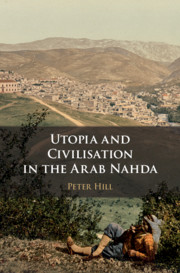Crossref Citations
This Book has been
cited by the following publications. This list is generated based on data provided by Crossref.
Bashkin, Orit
2021.
The Colonized Semites and the Infectious Disease: Theorizing and Narrativizing Anti-Semitism in the Levant, 1870–1914.
Critical Inquiry,
Vol. 47,
Issue. 2,
p.
189.
Arsan, Andrew
2021.
AN OTTOMAN ARAB MAN OF LETTERS AND THE MEANINGS OF EMPIRE, c. 1860.
Transactions of the Royal Historical Society,
Vol. 31,
Issue. ,
p.
89.
Abu-ʿUksa, Wael
2021.
Heterodox Christianity, Unitarianism and the Harmonization of Monotheism: The ‘Heresy’ of Khrīsṭufūrus Jibāra in Nineteenth-Century Syria.
Islam and Christian–Muslim Relations,
Vol. 32,
Issue. 4,
p.
361.
Anselmetti, Francesco
2022.
The ArabNahdaBetween Mastery and Servitude.
Global Intellectual History,
p.
1.
Khayat, Nicole
and
Kozma, Liat
2022.
Medicine and Arabic literary production in the Ottoman Empire during the nineteenth century.
The British Journal for the History of Science,
Vol. 55,
Issue. 4,
p.
515.
El-Sherif, Mona
2023.
Islam, technology, circulation, and the global humanist imaginary in ʿAli Mubārak's ʿAlam al-Dīn (1882).
Nineteenth-Century Contexts,
Vol. 45,
Issue. 3,
p.
271.
Bar Sadeh, Roy
2023.
Nahda-izing India: The Urdu-Hindi Debate and its Arabic Alternative, c. 1860s–1947.
International Journal of Middle East Studies,
Vol. 55,
Issue. 1,
p.
146.
Edwards, Anthony
2023.
Becoming the Muʿallim: how tradition and innovation made a Nahḍa icon.
Bulletin of the School of Oriental and African Studies,
Vol. 86,
Issue. 2,
p.
241.
Frenkel, Yehoshua
2024.
Post-Apocalyptic Cultures.
p.
149.
Alhashmi, Rawad
2024.
Post-Apocalyptic Cultures.
p.
167.
Edwards, Anthony
2024.
Orientalist Infotainment and the US Lecture Tour of Gregory M. Wortabet (1828–93).
Mashriq & Mahjar: Journal of Middle East & North African Migration Studies,
Vol. 11,
Issue. 1,





